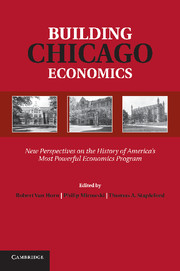 Building Chicago Economics
Building Chicago Economics Book contents
- Frontmatter
- Contents
- Figures and Tables
- Contributors
- Blueprints
- Orientation: In Search of the Chicago School
- Part One Economics Built for Policy: the Legacy of Milton Friedman
- Part Two Constructing the Institutional Foundations of the Chicago School
- Part Three Imperial Chicago
- Six Chicago Price Theory and Chicago Law and Economics
- Seven Intervening in Laissez-Faire Liberalism
- Eight Allusions to Evolution
- Nine On the Origins (at Chicago) of Some Species of Neoliberal Evolutionary Economics
- Part Four Debating “Chicago Neoliberalism”
- Index
- References
Eight - Allusions to Evolution
Edifying Evolutionary Biology rather than Economic Theory
from Part Three - Imperial Chicago
Published online by Cambridge University Press: 05 November 2011
- Frontmatter
- Contents
- Figures and Tables
- Contributors
- Blueprints
- Orientation: In Search of the Chicago School
- Part One Economics Built for Policy: the Legacy of Milton Friedman
- Part Two Constructing the Institutional Foundations of the Chicago School
- Part Three Imperial Chicago
- Six Chicago Price Theory and Chicago Law and Economics
- Seven Intervening in Laissez-Faire Liberalism
- Eight Allusions to Evolution
- Nine On the Origins (at Chicago) of Some Species of Neoliberal Evolutionary Economics
- Part Four Debating “Chicago Neoliberalism”
- Index
- References
Summary
The danger is that dabbling in sociobiology may prove to be more attractive to many economists than the use of sociobiological findings to improve our economics.
– Coase , 245Introduction
In some of their papers, the second generation Chicago economists Gordon Tullock, Gary S. Becker and Jack Hirshleifer explicitly forge a link with evolutionary biology. This chapter discusses these papers. I am interested mainly in two issues. One is whether these papers are in any way related to the so-called selection arguments that Alchian () and Friedman (), as key exponents of the first generation of the Chicago School of economics, advanced earlier (Vromen ). Do the papers build on the selection arguments, for example, or are they completely unrelated? The second issue is what specific forms the links forged with evolutionary biology take in the papers. In particular, what purposes are these links meant to serve? Are they meant to contribute to an improved economic theory, to an improved biological theory, or to both of them?
Alchian’s (1950) and Friedman (1953)’s Selection Argument: From Leaves around a Tree to Businessmen and Back
A lot has been written about Friedman’s () selection argument. However, for the purpose of this paper we can be very short. The crucial passage reads, “given natural selection, acceptance of the hypothesis [viz. the maximization-of-returns hypothesis] can be based largely on the judgment that it summarizes appropriately the conditions for survival” (Friedman , 22). Friedman argues that economists can confide in their maximization-of-returns hypothesis because it accurately describes the behavior of surviving firms. Unlike Alchian, who, as we shall see, warned economists not to be overconfident about the applicability of the hypothesis on selectionist grounds, Friedman apparently did not see any reason for economists not to base their confidence in the hypothesis on such grounds. Friedman’s main reason for forwarding his selection argument clearly was to restore or boost confidence in the maximization-of-returns hypothesis (or, more broadly, marginal analysis). As we shall see in the next sections, second-generation Chicago economists such as Tullock and Becker take the validity of this argument for granted not so much as a justification for their continued use of marginalist analysis in economics, but in their excursions into evolutionary biology. After all, Friedman’s argument seems to imply that maximization hypotheses accurately describes or predicts the outcomes of selection processes not only in the economic realm, but in any realm. In fact, in developing his argument that the maximization- of-returns hypothesis accurately describes the outcome of economic market selection, Friedman discusses the potential usefulness of a maximization hypothesis to predict behavior in the biological realm. What is interesting is that Friedman himself recoiled from urging biologists (and more broadly, evolutionary theorists) to accept maximization hypotheses.
- Type
- Chapter
- Information
- Building Chicago EconomicsNew Perspectives on the History of America's Most Powerful Economics Program, pp. 208 - 236Publisher: Cambridge University PressPrint publication year: 2011
References
- 2
- Cited by


